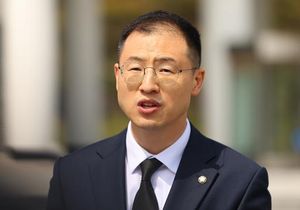On May 6, 2025, the Council of Ethics and Parliamentary Decorum of the Chamber of Deputies made a significant decision, suspending federal deputy Gilvan da Federal (PL-ES) from his mandate for three months. This decision came after a series of aggressive outbursts, including offensive remarks directed at fellow parliamentarians and public figures.
The suspension was approved with a vote of 15 in favor and 4 against. The council's actions were prompted by Gilvan's derogatory comments about licensed deputy Gleisi Hoffmann (PT-PR), whom he referred to in a session of the Public Security and Combating Organized Crime Commission as "que devia ser uma prostituta do caramba" (should be a damn prostitute). This statement, made during a heated exchange on April 29, 2025, was deemed incompatible with parliamentary decorum.
Deputy Ricardo Maia (MDB-BA), who served as the rapporteur for the case, emphasized that Gilvan's behavior transcended mere political disagreement or heated rhetoric. He stated, "The manifestations surpass the limits of parliamentary freedom of expression, involving personal attacks and moral disqualification, which hurt the dignity of the affected authorities and compromise the institutional values of the Chamber of Deputies."
The original request from the Board of Directors of the Chamber sought a six-month suspension due to Gilvan's history of violent behavior. However, after considering the context and Gilvan's subsequent apology, Maia recommended a reduced suspension of three months, viewing it as a necessary measure to uphold the dignity of parliamentary representation.
In his defense, Gilvan argued that the process against him was flawed, claiming he did not directly insult Hoffmann. He expressed regret during a speech in the plenary, stating, "I am sorry to those who felt offended; I recognize that in the heat of the moment, I went overboard."
Despite his apology, many of his colleagues remained unsupportive. The president of the Chamber, Hugo Motta (Republicanos-PB), acknowledged Gilvan's promise to change his behavior, suggesting it was a step in the right direction. However, the lack of defense from his party, the PL, indicated a broader concern about his aggressive conduct.
The incident is not an isolated one in Gilvan's political career. He has a history of violent outbursts, including a prior incident where he wished for President Luiz Inácio Lula da Silva's death, stating, "For me, I want Lula to die, I want him to go to the fifth hell." This remark was made in reference to alleged assassination plots against Lula, Vice President Geraldo Alckmin, and Supreme Federal Court Minister Alexandre de Moraes, which surfaced in a complaint by the Attorney General's Office (PGR) in February 2025.
The backlash against Gilvan's comments has been considerable, even among those who typically oppose Lula. His statements have raised alarms regarding the increasing levels of aggression and hostility within Brazil's political discourse. Since the current legislative session began in 2023, there has been a noticeable rise in verbal violence, particularly between members of the so-called "root bolsonarism" faction and left-leaning representatives.
In light of the ongoing tensions, the Board of Directors had previously indicated that they were prepared to take action against Gilvan, which ultimately led to the suspension. The decision to suspend him for three months reflects not only the severity of his actions but also a collective desire among lawmakers to restore decorum in parliamentary proceedings.
The representation against Gilvan was formally submitted by the Board of Directors on April 30, 2025, following a complaint from the Parliamentary Ombudsman, led by Deputy Diego Coronel (PSD-BA). It highlighted Gilvan's offensive remarks about Hoffmann and his verbal confrontation with her husband, Deputy Lindbergh Farias (PT-RJ), during the same session.
As the situation unfolds, Gilvan has indicated that he does not plan to appeal the suspension. However, should he choose to challenge the decision in the plenary, he would need at least 257 votes to overturn the council's ruling. Meanwhile, the Ethics Council may still consider initiating a disciplinary process against him, which could potentially lead to the revocation of his mandate.
This episode serves as a stark reminder of the challenges facing Brazilian politics, where aggressive rhetoric and personal attacks have become increasingly common. As lawmakers grapple with the implications of such behavior, the suspension of Gilvan da Federal may represent a critical step toward restoring a sense of respect and dignity within the legislative process.
In conclusion, the suspension of Deputy Gilvan da Federal highlights the ongoing struggle within Brazil's political landscape to maintain decorum and civility among elected officials. As the country navigates these turbulent waters, the hope remains that such measures will foster a more respectful and constructive dialogue in the future.





